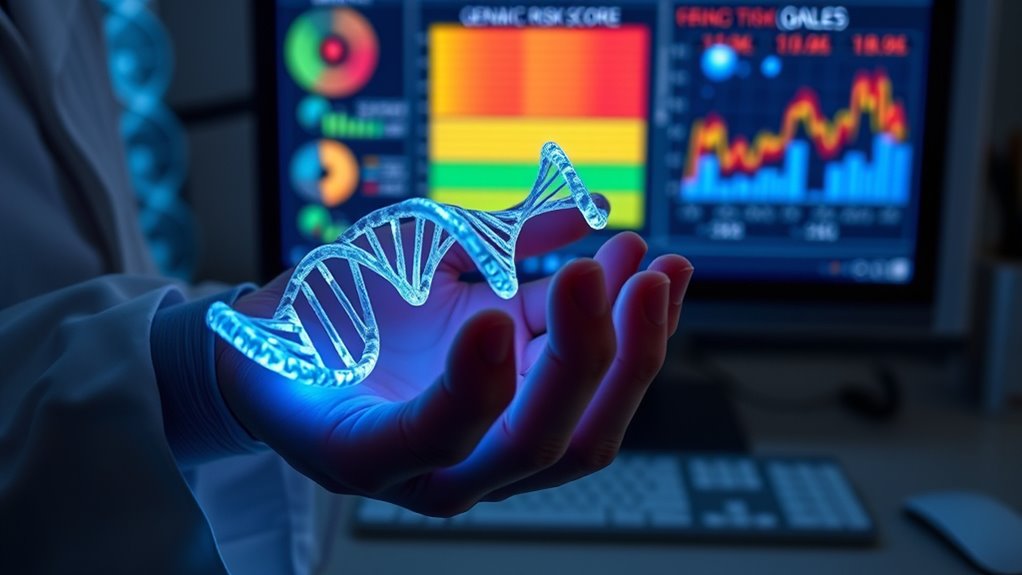Predictive genomics analyzes your DNA to spot cancer risks early and help guide personalized prevention. By identifying inherited mutations and biomarkers, it enables proactive health decisions and targeted screening. Advances in sequencing tech, like next-generation sequencing, make detecting mutations quicker and more accurate. While ethical and privacy concerns exist, experts focus on secure data handling to protect you. To learn how these innovations can impact your health, discover more about the latest genomic strategies today.
Key Takeaways
- Genetic testing identifies inherited mutations linked to increased cancer risk, enabling early detection and preventive strategies.
- Advances in sequencing technologies, like NGS, allow rapid analysis of cancer-associated genetic markers.
- Combining genetic data with lifestyle factors improves personalized risk assessment and early intervention plans.
- Ethical and privacy considerations ensure secure handling of sensitive genetic information during risk forecasting.
- Integrating genomic insights into healthcare supports targeted treatments and lifestyle modifications for cancer prevention.
Understanding the Basics of Predictive Genomics

Predictive genomics is a rapidly evolving field that focuses on analyzing genetic information to forecast an individual’s health risks and disease predispositions. By examining your DNA, scientists can identify genetic predispositions that increase your likelihood of developing certain conditions. Inherited mutations are key clues in this process, as they are variations passed down from your parents that influence your health. These mutations can signal a higher risk for diseases like cancer, heart disease, or diabetes. Understanding your genetic makeup allows for early interventions and personalized prevention strategies. It’s important to recognize that not everyone with a genetic predisposition will develop a disease, but knowing about inherited mutations helps you make informed decisions about your health and lifestyle. Incorporating knowledge about genetic testing can further enhance your awareness and proactive health management.
How Genetic Testing Identifies Cancer Risks

Genetic testing detects specific markers linked to increased cancer risks, helping you understand your predisposition. Risk assessment techniques analyze these markers to give a clearer picture of your likelihood of developing certain cancers. This information empowers you to make informed decisions about your health and preventive measures. Engaging in hackathons focused on healthcare innovation can also accelerate the development of new predictive tools and solutions.
Genetic Marker Detection
How do scientists identify specific genetic variations linked to cancer risks? They analyze genetic mutations that may increase susceptibility and use advanced testing methods to detect these markers. This process helps with risk stratification, categorizing individuals based on their genetic predisposition. To do this effectively, scientists:
- Sequence DNA samples to find alterations in genes associated with cancer.
- Use targeted panels focusing on known genetic mutations linked to specific cancers.
- Compare results against databases to identify high-risk mutations.
- The accuracy of detection can be influenced by the color accuracy of the testing methods used.
Risk Assessment Techniques
Have you ever wondered how genetic testing determines your risk of developing cancer? It primarily involves analyzing your genetic inheritance to identify specific gene variants linked to higher cancer susceptibility. These tests examine DNA for mutations in genes like BRCA1 and BRCA2, which notably increase risk. However, genetics isn’t the only factor; lifestyle factors also play a vital role. Your habits—such as smoking, diet, and sun exposure—can influence your overall risk profile. Combining genetic data with lifestyle information allows healthcare providers to create a thorough risk assessment. This approach helps you understand your predisposition more accurately and guides personalized prevention strategies. Additionally, integrating AI security techniques can enhance the accuracy and confidentiality of genetic data analysis, ensuring your sensitive information remains protected. Ultimately, risk assessment techniques empower you to make informed decisions about screening, lifestyle changes, and early interventions.
The Role of Biomarkers in Early Detection

Biomarkers play a vital role in detecting diseases early, often before symptoms appear. You can identify genetic indicators of risk through advanced detection techniques, improving chances for successful intervention. Understanding these methods helps you appreciate how early diagnosis can lead to better health outcomes.
Genetic Indicators of Risk
Genetic indicators of risk serve as crucial tools in early detection efforts, allowing researchers and clinicians to identify individuals who may be predisposed to certain diseases before symptoms appear. Your genetic predisposition and family history play key roles in evaluating cancer risk. Incorporating lifestyle factors, such as remote work habits that promote health, can further optimize your overall well-being.
Biomarker Detection Techniques
Detecting biomarkers is essential for the early identification of diseases, often before symptoms emerge. These biomarkers help you understand your unique genetic makeup, enabling personalized treatment strategies tailored to your risk profile. Techniques like blood tests, imaging, and genomic sequencing allow you to identify specific protein levels or genetic mutations associated with cancer. Early detection through biomarker analysis can markedly improve treatment outcomes and reduce invasive procedures. Additionally, recognizing biomarkers informs genetic counseling, guiding you on preventive measures and lifestyle changes. By incorporating these detection techniques into your healthcare plan, you can stay ahead of potential health issues, making informed decisions about your future. Furthermore, understanding regional flavors and traditions can enrich your appreciation of cultural health practices and dietary influences. Ultimately, biomarker detection empowers you with insights that can lead to early interventions and better prognosis.
Advances in Sequencing Technologies

Recent breakthroughs in sequencing technologies have dramatically accelerated our ability to decode genomes with greater speed and accuracy. These innovations enable you to identify genetic variations linked to cancer risk more efficiently. Here are three key advances:
- Next-generation sequencing (NGS) allows rapid, high-throughput analysis of entire genomes, supporting personalized medicine approaches.
- Single-molecule sequencing provides detailed insights into complex genetic regions, improving detection of mutations.
- Gene editing tools like CRISPR are now integrated with sequencing, facilitating targeted interventions based on genetic data.
- Speaks 4 Me Online employs these cutting-edge techniques to enhance communication and education about genetic health.
These advancements not only enhance early detection but also pave the way for tailored treatments, making gene editing and personalized medicine more precise and effective in managing cancer risk.
Interpreting Genetic Risk Scores

Understanding your genetic risk scores is essential for making informed health decisions, as these scores synthesize complex genetic data into a single metric indicating your likelihood of developing certain conditions. By interpreting these scores, you can tailor your approach to personalized prevention and discuss options with a genetic counselor. A high score suggests increased risk, prompting proactive measures. Visualize your risk with this simplified view:
| Score Range | Interpretation | Recommended Action |
|---|---|---|
| 0-20 | Low risk | Regular screenings |
| 21-40 | Moderate risk | Lifestyle adjustments |
| 41-60 | Elevated risk | Consider genetic counseling |
| 61-80 | High risk | Preventive measures advised |
| 81-100 | Very high risk | Close monitoring, interventions |
Interpreting scores enables you to make targeted decisions, emphasizing prevention and professional guidance. Exploring genetic testing can further enhance your understanding of your health profile.
Ethical Considerations and Privacy Concerns

As genetic information becomes more accessible through advances in predictive genomics, ethical considerations and privacy concerns naturally come to the forefront. You need to be aware of how your genetic data is used and protected. Key issues include:
- Ensuring your genetic privacy by understanding who has access to your data and how it’s stored.
- Giving informed consent before undergoing genetic testing, so you understand the potential risks and benefits.
- Addressing the possibility of genetic discrimination by employers or insurers based on your risk profile.
- Utilizing vetted data handling practices to ensure your genetic information remains secure and confidential.
Integrating Genomic Data Into Healthcare Strategies

Integrating genomic data into healthcare strategies has the potential to transform patient care by enabling more precise diagnoses and personalized treatments. When you incorporate genetic information, healthcare providers can recommend targeted interventions and support genetic counseling to interpret your risks accurately. This approach helps you understand your inherited predispositions and make informed decisions. Additionally, genomic insights can guide lifestyle modifications, such as diet, exercise, or screening schedules, to reduce your cancer risk. By tailoring prevention and treatment plans to your genetic profile, you become an active participant in your health management. This integration ensures that interventions are more effective, timely, and aligned with your unique genetic makeup, ultimately improving outcomes and empowering you to take control of your health journey.
Future Directions and Emerging Developments

Looking ahead, the future of predictive genomics is poised to bring rapid advancements driven by technological innovation and increased data sharing. As this field evolves, you’ll see a focus on safeguarding genomic privacy and ensuring data security. To navigate these changes, consider these developments:
- Improved encryption methods will protect your sensitive genetic information from breaches.
- New policies will enhance control over who accesses your genomic data, maintaining privacy.
- Advanced AI algorithms will analyze data more efficiently while respecting data security standards.
- Ongoing research into AI Security will be crucial to prevent exploitation or misuse of sensitive genomic data.
These innovations will help balance the benefits of early cancer risk detection with the need to protect your personal information. Staying informed about emerging regulations and security measures will be key as predictive genomics becomes more integral to healthcare.
Frequently Asked Questions
How Accurate Are Current Predictive Genomic Tests for Cancer Risk?
You wonder about the accuracy of current predictive genomic tests for cancer risk. These tests offer valuable risk assessment tools, but their genetic accuracy varies depending on the type of cancer and the genetic markers analyzed. While they can identify increased risk factors, they aren’t definitive diagnoses. You should view them as part of a broader risk assessment strategy, helping you make informed decisions about screening and prevention rather than relying solely on their results.
Can Predictive Genomics Prevent All Types of Cancer Effectively?
Think of preventing cancer with predictive genomics like trying to catch every wave at the beach. While it can help identify risks early, it doesn’t catch all types of cancer. You still need to take into account lifestyle factors and environmental influences, which play vital roles. Predictive genomics offers a valuable tool, but it’s not foolproof. Combining it with healthy habits and environmental awareness gives you the best shot at prevention.
What Are the Costs Associated With Implementing Genomic Cancer Screening?
When you consider genomic cancer screening, the costs involve a detailed cost analysis, including testing fees, laboratory processing, and follow-up care. Insurance coverage varies, so you might face out-of-pocket expenses if your insurer doesn’t fully cover the tests. it is crucial to check with your provider beforehand to understand what costs you’ll be responsible for, ensuring you’re prepared financially for early detection and potential treatment benefits.
How Do Genetic Variations Influence Individual Cancer Risk Predictions?
Did you know that genetic variations can significantly impact your cancer risk? You play a vital role in risk assessment by understanding your genetic markers. These markers help predict your likelihood of developing certain cancers, enabling personalized prevention strategies. Your unique genetic profile influences how accurately your risk is forecasted, making it essential to take genetic variations into account when evaluating your individual cancer risk. This personalized approach improves early detection and targeted interventions.
Are There Specific Populations That Benefit More From Genomic Cancer Forecasting?
You might find that populations with greater genetic diversity benefit more from genomic cancer forecasting because their genetic variation offers more personalized insights. However, cultural considerations also play a role, as acceptance and understanding of genetic testing vary across groups. By considering both genetic diversity and cultural factors, you can better tailor cancer risk predictions, ensuring the technology serves diverse populations effectively and ethically.
Conclusion
By understanding and leveraging predictive genomics, you can catch cancer risks early and improve outcomes. Did you know that recent studies show genetic testing can identify up to 80% of high-risk individuals before symptoms appear? Embracing these advances means you’re taking proactive steps for your health. As technology continues to evolve, staying informed and ethical will empower you to make better decisions and potentially save lives through early detection.










